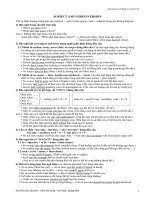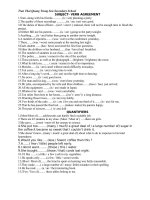Subject and Verb Agreement
Bạn đang xem bản rút gọn của tài liệu. Xem và tải ngay bản đầy đủ của tài liệu tại đây (144.15 KB, 8 trang )
The subject and verb must agree in number: both must be singular, or
both must be plural. Problems occur in the present tense because one
must add an -s or -es at the end of the verb when the subjects or the
entity performing the action is a singular third person: he, she, it, or words
for which these pronouns could substitute.
Singular
Plural
The student sings.
(He or she sings)
Your children sing.
(They sing)
Where is my subject?
•
Most likely, your verb will agree with the first noun to the left of the verb:
1- The Supreme Court judge decides the appropriate penalty.
Subject: judge Verb: decides
2- The committee members were satisfied with the resolution.
Subject: members Verb: were
•
Occasionally, a sentence has the subject after the verb instead of before
it. This strategy is often used for poetic effect.
1- Over the ripples glides a small canoe.
Subject: a small canoe Verb: glides
2- There was a well-known writer at the meeting.
Subject: a well-known writer Verb: was
You will not find the subject in a modifying phrase (MP), a phrase
that starts with a preposition, a gerund, or a relative pronoun and that
modifies the meaning of the noun or subject under discussion.
1- The group of students is going on a field trip.
Subject: the group MP: of students Verb: is
2- The survey covering seven colleges reveals a growth in
enrollment.
Subject: the survey MP: covering seven colleges Verb: reveals
3- The speaker whom you saw at the lecture is one of the state
senators from Minnesota.
Subject: the speaker MP: whom you saw at the lecture Verb: is
If subjects are joined by and, they are considered plural.
The quarterback and the coach are having a conference.
Subject: the quarterback
and the coach
Verb: are having
If subjects are joined by or or nor, the verb should agree with the
closer subject.
Either the actors or the director is at
fault.
Subjects: actors, director Verb: is
Either the director or the actors are at fault.
Subjects: director, actors Verb: are
The relative pronouns (who, whom, which, and that)
are either singular or plural, depending on the words they refer to.
The sales manager is a good researcher who spends a great amount of time
surfing the Web for information.
Subject: the sales manager Verbs: is, spends
Sales managers are good researchers who spend a great amount of time
surfing the Web for information.
Subject: sales managers Verbs: are, spend









